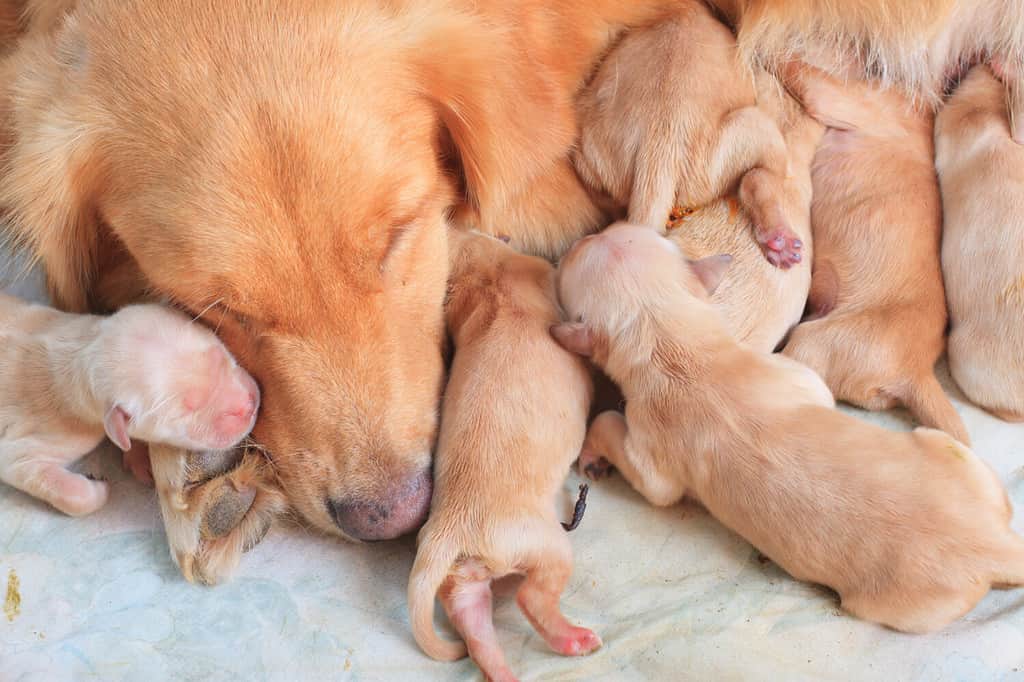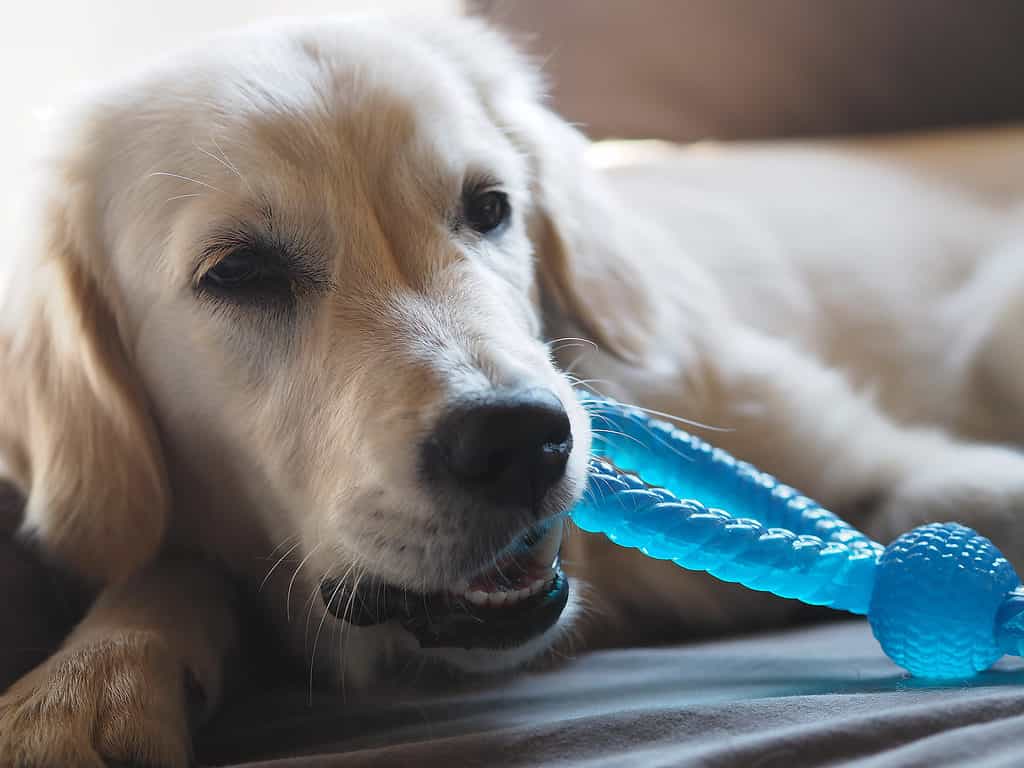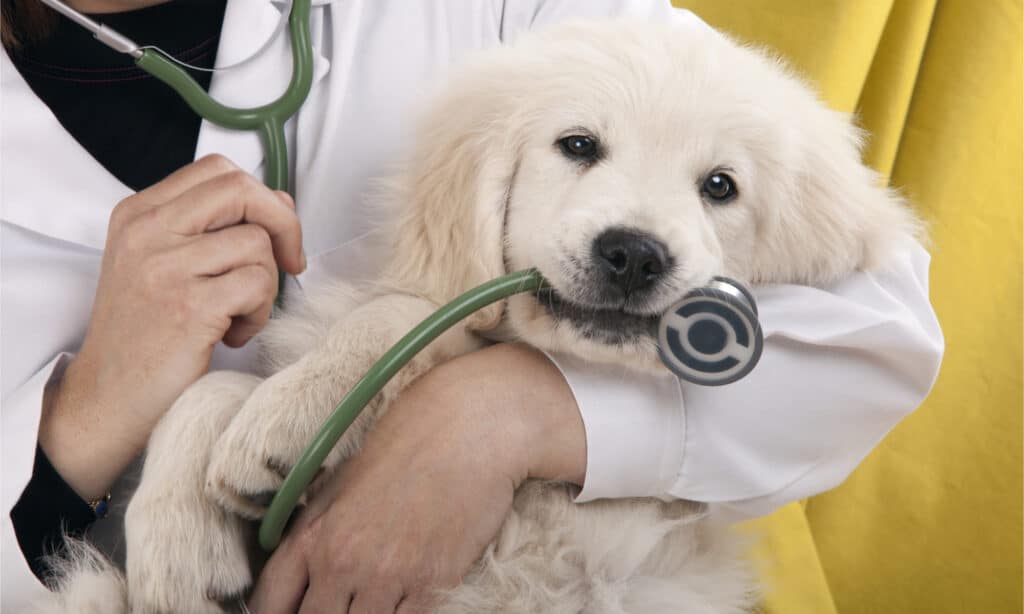Golden Retrievers are large dogs with golden-colored fur. They were originally bred to hunt birds, both on land and in the water.
While Goldens aren’t the right puppies for everyone, they’re popular for good reason: they’re agreeable, smart, and energetic. They make great additions to active families.
When adopting a Golden Retriever puppy, it’s important to find an ethical breeder or rescue. This involves research and, usually, a waiting period.
In this article, we’ll look at some beautiful Golden Retriever puppy photos, talk about the cost of Golden puppies, and more.
Golden Retriever Puppy Pictures

These Golden Retriever puppies are far too young to be separated from their mother and will stay close to her at all times.
©stockphoto mania/Shutterstock.com

As Goldens age, their sense of hearing, sight, and smell develop.
©iStock.com/fusaromike

Chewing is important for all dogs, but especially for puppies who are still growing their adult teeth.
©iStock.com/zabo69005

Golden puppies are active, playful, and sweet.
©iStock.com/exies

Routine veterinary care is essential to your Golden Retriever puppy’s health.
©Roger costa morera/Shutterstock.com
How Much Do Golden Retriever Puppies Cost?
You can expect to pay around $1,500-$3,000 for a Golden Retriever puppy from a reputable breeder, though some will fall slightly outside of this range.
Puppy costs vary depending on the cost of living in the breeder’s area and the dogs’ lineage. For instance, puppies with famous or award-winning parents typically cost more.
Exceptionally low or high prices are a red flag that you’re dealing with a puppy mill or backyard breeder. Low prices typically indicate mass breeding.
High prices should be justified, and the breeder’s reasoning should make sense. They shouldn’t charge more based on a dog’s sex or color, for instance.
It’s also vital to think about how much your Golden Retriever will cost throughout their lifetime. You can expect to spend at least $1,000 a year, possibly more. The puppy and senior years are often the most expensive.
This is due to puppy vaccines and puppies’ tendencies to get into mischief, which can lead to injuries. Senior dogs are more prone to age-related health conditions that can get pricey.
Where to Find a Golden Retriever Puppy

It’s important to purchase your puppy from an ethical breeder or rescue.
©Kashaeva Irina/Shutterstock.com
There are a few places you can find a Golden Retriever puppy. The most common, due to the breed’s popularity, is directly from a breeder. You might also occasionally see Golden puppies in shelters or rescues.
If you opt for a rescue dog, your best bet will be a breed-specific rescue. You’ll likely have to wait for some time, especially if you’re set on adopting a young pup.
Always research your rescue thoroughly. Just as there are bad breeders, there are bad rescue organizations. Some are even puppy mills posing as rescue facilities in order to sell puppies to unsuspecting people.
Golden Retriever Breeders to Avoid
Of course, you also want to avoid poor breeding. Golden Retrievers can have a variety of genetic health problems caused by poor breeding, and paying for these pups funds the practice. There are two types of breeders to avoid:
- Puppy mills mass-produce puppies without care for their health or temperament. The puppies and especially the parent dogs are typically neglected or even abused.
- Backyard breeders tend to be everyday people breeding on a smaller scale, but they don’t have the knowledge or care to breed responsibly. They may also neglect or abuse their dogs, but even if they care for them well, they can cause a lot of damage to the puppies by passing along genetic health problems or giving bad care advice to puppy buyers.
Finding a Reputable Golden Retriever Breeder
Instead, you want to look for reputable breeders who are experienced and knowledgeable about their breed. Reputable Golden Retriever breeders will:
- Complete OFA genetic health testing for both parents and will never breed unhealthy dogs.
- Ensure their dogs never end up in a shelter by keeping their name on the dogs’ microchips alongside yours, and stipulating in your contract that the puppies go back to them if rehoming is necessary.
- Find homes for their puppies before they’re born. This means you’ll be put on a waitlist and will not be able to adopt a puppy same-day.
- Keep the mother and puppies in a home environment complete with all of their needs, including plenty of space. You should be able to see where they’re kept yourself.
- Begin socializing and training their puppies from a young age so that they’re set up for success in their new homes.
- Breed their dogs minimally and won’t have many litters for sale at once. When questioning how many litters is too much, consider the work that goes into raising puppies well and how many dogs the breeder can realistically care for. Most will only have one, maybe two, litters at a time.
- Provide references, including to previous puppy buyers and to their current veterinarian.
- Provide veterinary records.
- Answer any questions you have openly and honestly, including about the faults of the breed.
- Have questions for you regarding your lifestyle and the care you can provide for a dog. They want their puppies to go to the best homes possible!
What to Expect from Your Growing Golden Retriever Puppy
Golden Retrievers reach their full height at around a year of age but will continue to gain muscle and weight until 18 months. Your dog should stop growing at around 55-75 pounds.
Socialization and training should begin as soon as you bring your puppy home, but please keep your expectations realistic. Mouthiness and potty accidents are normal at this age, and your Golden won’t have a lot of impulse control until they’re older.
Any training sessions should be kept short and fun. Focus mostly on basic manners to make your pup easy to live with and getting them used to the world around them.
Avoid too much jumping and be mindful not to overexercise your pup while they’re still growing. This can lead to joint issues later in life.
How Long do Golden Retrievers Live?
A Golden Retriever puppy is a 10-12-year commitment, and some dogs will live even longer than this! It’s important to be prepared for what your life will bring in that time, including any moves or other big life changes.
You can ensure your Golden lives a long, healthy life by bringing them to the veterinarian for annual check-ups and whenever they’re sick. A good diet and exercise routine also go a long way to keeping your pup fit.
Do Golden Retrievers Make Good Pets?

This breed is best for people who are active and want to spend time doing outdoor activities with their dogs.
©alexgo.photography/Shutterstock.com
Golden Retrievers are the third most popular dog breed in the United States. People love their goofy attitudes, loyalty, and intelligence. They’re known for being friendly and easy to train.
Goldens tend to make great family dogs because they tend to do well with children and other dogs, though interactions should still be supervised.
However, Golden Retrievers do have their downsides as well. Firstly, they’re large dogs that can be expensive and difficult to manage compared to smaller breeds.
They also shed heavily, and their fluffy coats should be brushed once to twice weekly to prevent tangles and remove dead fur. During shedding season twice a year, your Golden will need to be brushed daily.
The last drawback is that Golden Retrievers need a lot of exercise. This is great for active families who are willing to spend plenty of time doing activities with their dogs, but it can be too much for some people.
Dogs who don’t get enough exercise may become bored or anxious, leading to poor behavior such as excessive barking or chewing.
Overall, the breed you adopt is a personal choice. Golden Retrievers definitely aren’t the best dogs for everyone, but for many families, they’re the perfect fit!
Thank you for reading! If you have feedback on this post, please contact the AZ Animals editorial team.
The photo featured at the top of this post is © iStock.com/zabo69005
Ready to discover the top 10 cutest dog breeds in the entire world?
How about the fastest dogs, the largest dogs and those that are -- quite frankly -- just the kindest dogs on the planet? Each day, AZ Animals sends out lists just like this to our thousands of email subscribers. And the best part? It's FREE. Join today by entering your email below.
Thank you for reading! Have some feedback for us? Contact the AZ Animals editorial team.







